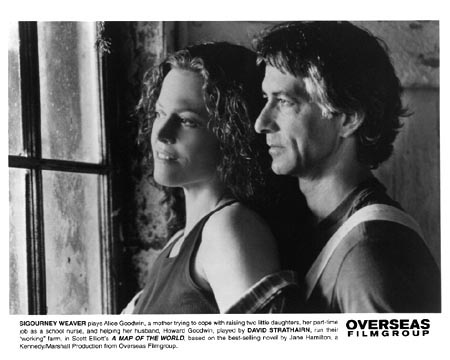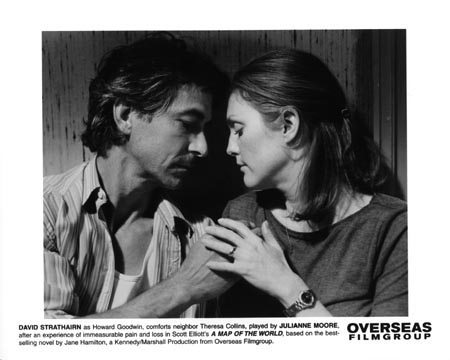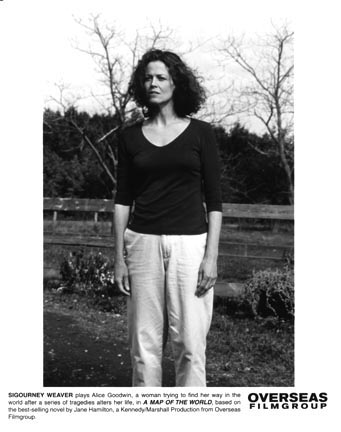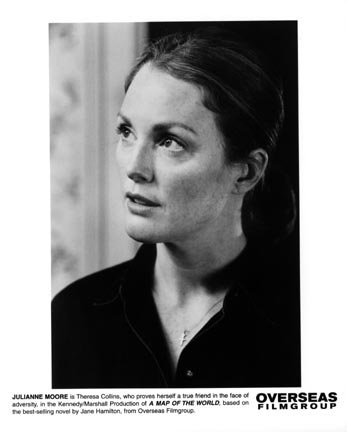
A MAP OF THE WORLD

With Sigourney Weaver, David Strathairn, directed by Scott Elliott. Produced by Kathleen Kennedy and Frank Marshall. The film adaptation of Jane Hamilton's best-selling novel. IMDB. Official site. Images. Information. Links to reviews. Photos from the press kit copyright First Look Pictures.

From Variety's Richard Natale, 4 February 2000:
Sigourney Weaver says she felt liberated by her role in A Map of the World because her director, Scott Elliott, did not encourage her to make the character more sympathetic. "I was allowed to play her as flawed, warts and all," says the actress, who earned degrees from Stanford U. and the Yale School of Drama.
Though Weaver approached the role unsentimentally, she wasn't without trepidation. She wondered if the audience could forgive the character, who is taking care of a friend's child who accidentally drowns. But co-star Louise Fletcher told her, "You'll have every woman's sympathy because, although she's done the unthinkable, it's what most women are most fearful of doing themselves."

From the press kit:
As a mother trying to cope with raising two little daughters, her part-time job as a school nurse, and helping her husband run their "working" farm, Alice Goodwin (Sigourney Weaver) has an unflappable, almost whimsical attitude toward the complexities of life. But her outspoken "mouth" -- reflecting her droll perspective on human nature -- is often wrongly misinterpreted by the simple folk in the rural Wisconsin town where they live. As relative "newcomers," the townsfolk treat Alice and her husband, Howard (David Strathairn) as outsiders, and their only real friends are another young couple, Dan and Theresa Collins (Julianne Moore), who also have two little girls. Alice and Theresa have become best friends and often babysit each other's children.
One morning, while babysitting Theresa's children, as well as her own -- having promised to take them swimming in the pond on the farm -- Alice is momentarily distracted as she searches for her bathing suit. A few minutes later, she is horrified to discover Theresa's two-year-old daughter, Lizzy, floating face-down in the pond. Although Alice immediately pulls Lizzy out of the water and administers CPR, the child remains comatose and, a few days later, she dies.
Theresa's pain and loss is immeasurable, and so is Alice's, but she is more numbed by the terrible pain of guilt. Howard's mother (Louise Fletcher) comes briefly to lend a hand, but only succeeds in making Alice feel more useless and miserable. Her life has taken on a whole new dimension for which Alice is unprepared, and the community now sees her as the person solely responsible for this great tragedy, instead of empathizing with her and realizing that it could happen to anyone. Suddenly Alice is seen as a reckless woman, unpredictable in her ways, and even Alice cannot help but see herself as worthless.
In the midst of all this turmoil of guilt and grief, an altogether shocking thing happens: a young boy at the school accuses Alice of sexual abuse and she is abruptly arrested, taken away from her family and imprisoned because she and her husband cannot raise the $100,000 required for bail. The charges seem totally fabricated -- Alice had recently quarreled with the child's mother (Chloe Sevigny), accusing her of being an irresponsible parent for habitually sending her sick child to school. But, as Alice's life spins even further out of control, still paralyzed with guilt over Lizzy's drowning, she seems to have no will to defend herself.
Producers Kathleen Kennedy and Frank Marshall invited Obie-winning theater director Scott Elliot to direct A Map of the World. Elliott and his writer friend Peter Hedges completed the screenplay in the spring of 1997. Hedges explains, "The power of this is in its silences and implications." Elliott concurs. "It's a real human drama. It has no effects, it's really bare, very spare, and it's about the people. That's why I got excited about doing it." Author Jane Hamilton was impressed with the adaptation.
"Sigourney is perfectly cast in this because she's such a mixture of real life and mischief, which is very right for the character. Her sense of humor is precisely what this movie needs," says Elliott. "One of the reasons I took the project on is because there were two great parts for women, and I wanted to give two great actresses the rare opportunity to play the kind of roles they should be playing." Elliott was further delighted to have Louise Fletcher in the film. "Who can forget Louise Fletcher's definitive performance in One Flew Over the Cuckoo's Nest? I'm so excited they're all doing this film."
"It's been a 100 percent collaboration," sums up Elliot. "The actors are all really smart and diverse. They don't just think about acting, they bring in other elements, so I take whatever they give me and try to help them shape it into something."
From Variety's Susanne Ault:
Tyro helmer Scott Elliot was downright giddy before the Los Angeles premiere of indie drama A Map of the World.
"I feel like I got a Ph.D. in filmmaking during this last year," Elliot told audiences before the screening in Santa Monica. "It's just been a remarkable experience doing my first film."
Perhaps still in Thanksgiving mode, Elliot was also grateful to the picture's producers Kathleen Kennedy and Frank Marshall: "That they trusted me with the material is amazing."
And Map star Sigourney Weaver said she "was in very good hands" with Elliot. But filming wasn't exactly a walk in the park. "We shot in 30 days, so it was sort of a tumbling experience," she said.
Yet Weaver enjoyed playing her complex character, a mother accused of sexual assault -- "This (role) is what I have my heart in right now."
Similar vibes came from Marshall: "I love the story, and that's what it's all about." Plus, "a lot of heart and soul came from the cast, and that's what got (the film) made."
Elaborating, Kennedy said, "it was incredibly enjoyable (to be able) to ask people to do things as a labor of love rather than a deal for money -- everyone had such a great time."
From The Hollywood Reporter's Kirk Honeycutt:
A Map of the World affords Sigourney Weaver the opportunity to trace the emotional and spiritual near destruction of an independently minded woman. Her fall from grace is so cruel and downright Biblical in the breathtaking chain of tragic events as to play like a female version of the story of Job.
The subject matter necessarily will limit audiences to those willing to sit still for a harrowing journey to hell and back.
"Map" concerns the victimization of a woman who doesn't live up to her community's expectations. When tragedy befalls a woman who dares to speak her mind and paint her barn blue, the citizens of a Midwestern town turn on her with such self-righteous fury as to befuddle any reasonable viewer.
There's more than a little exaggeration here. Indeed, the feminist viewpoint is so overstated as to tear the dramatic fabric of the movie itself.
Weaver's Alice Goodwin is seen as a good, caring mother who holds down a part-time job as school nurse while helping her husband Howard (David Strathairn) run the family farm. She does, however, speak her mind.
While baby-sitting her best friends' children, she is momentarily distracted and the youngest child accidentally drowns. The community swiftly condemns her, first with angry whispers and sullen stares. And when the tragedy encourages a naughty boy's mother (Chloe Sevigny) to bring bogus charges of child abuse against Alice, the entire town instantly rises up against her.
She's jailed and her financially struggling husband cannot raise the bail that is set staggeringly high. Her fellow inmates taunt her unmercifully, and even Howard doubts her.
It gets worse, but what is most troubling is that Alice seems to enjoy her victimization. What Weaver and first-time director Scott Elliott fail to make clear is whether this aberration is the result of a mental breakdown or simply Alice's way to cope with an impossible situation.
For that matter, everyone's behavior is curious. Why is Howard so insensitive? Why do all of Alice's friends and colleagues turn against her on such flimsy evidence? Why does the child's mother even bother with the false charge?
The answer to all these questions is that the film, adapted by Peter Hedges and Polly Platt from Jane Hamilton's novel, wants to make a point. Society goes out of its way to punish independent women, and the filmmakers apparently feel no obligation to make any of this plausible.
Weaver's performance is certainly never dull, but she fails to let us inside her character. We're never certain what motivates her.
Strathairn has been handed a loaded deck with this role: The filmmakers were determined that the husband act the complete wimp throughout the ordeal. And Julianne Moore, as Alice's estranged best friend who finally comes to her rescue, has her puzzling moment too when she makes a pass at Alice's husband. Where did that come from?
The film, shot near [Toronto] where it had its premiere, is exceedingly well-made. But it becomes overbearing during those moments when it tries so hard to shock and disturb.
Overseas Filmgroup
Producers: Kathleen Kennedy, Frank Marshall, Lisa Niedenthal
Director: Scott Elliott
Writers: Peter Hedges, Polly Platt
Based on the novel by: Jane Hamilton
Executive Producer: Willi Baer
Director of photography: Seamus McGarvey
Production designer: Richard Toyon
Music: Pat Metheny
Costume designer: Suzette Daigle
Editors: Craig McKay, Naomi Geraghty
Color/stereo
Cast:
Alice Goodwin: Sigourney Weaver
Theresa Collins: Julianne Moore
Howard Goodwin: David Strathairn
Paul Reverdy: Arliss Howard
Carole MacKessy: Chloe Sevigny
Nellie: Louise Fletcher
Running time -- 125 minutes
MAIN
CONTENTS
FAQ
RESUME
PHOTOS
DS9
CONS
ART
BOOKS
LINKS






